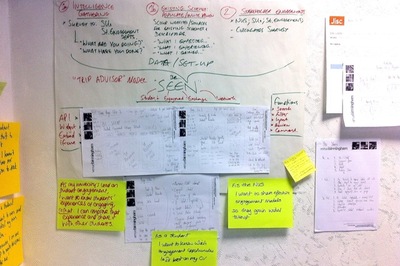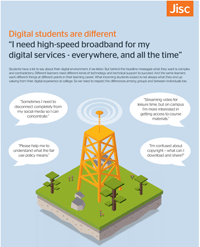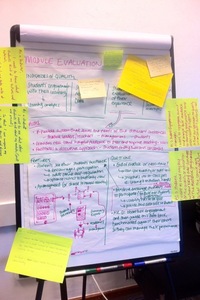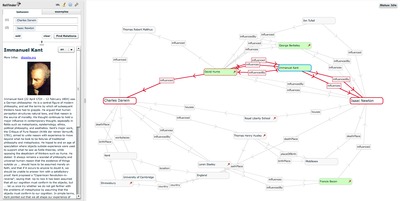Jisc student experience creativity workshop
George Munroe Tue 02 Jun 2015 updated: Tue 16 Jun 2015
Wednesday 20 May through Thursday 21 May 2015
Birmingham conference centre
#JiscCreativity

I was delighted to get the invitation to this event from Lawrie Phipps in April. There wasn't much information distributed about it beforehand, other than it would be quite an open collaborative event, mostly paper based and seeking some creative ideas—which made it all very intriguing!
We began with a lot of "post-it" stickers, large sheets of paper, coloured pens, blu-tack... and continued with them, then did more with them, then more, and the next day did the same. We were on our feet a lot, constantly seeking new free areas of wall. And we tried a lot of different chairs at different tables as we met more of, and deliberated with, our fellow attendees. A technicolor Kanban wall evolved around us, morphing as the workshop progressed from outputs of a standard PESTLE consideration of the student experience to roughly crafted project plans for creating enhancements to the current state of affairs.
Some of the "big" themes of the workshop that stood out for me included the following:
- Evolution versus revolution, or put another way, small steps or radical steps toward change and, hopefully, progress. Can we keep on building on structures that we have already created for "delivering to our student customers" or should we abandon these as out of date and ineffective and think more freely about what is needed going forward? We were encouraged to think about major/radical creativity and many agreed that this is what was needed.
- A large part of the student experience today is completely outside the "institution framework" with varying degrees of overlap in different institutions. We would like the whole of the institutional effort to be inside the sphere of the student experience, more in tune with them and meaningful to them.
- It was felt that a traditional (lecture centered) pedagogy often could, and should, be replaced by problem or project based learning—a paradigm change already embraced by most medical schools. Reports were also shared of primary or second level schools that had adopted this approach with success. Students learn from each other as they face challenges that require new learning and understanding.
- Student "services" in the UK tend to be less well established than in the US. This is changing fast as the importance of student customers and competition for them has rocketed. Involving students in the provision of these services and engaging student representatives in other areas of institution operation is seen as important.
- Technology has a role to play, but not necessarily a central one when compared to the institutional cultural shifts required to align with contemporary student aspirations. Nevertheless the provision of network access on demand, intuitive mobile device apps for institution information and updates, location based alerts and open communication channels, are all seen as basic building blocks on which an enhanced student experience can be based. Many of these have already been confirmed with students and are depicted in the range of posters developed under the Jisc Digital Student project.


I was surprised that Learner Analytics did not feature more in discussions. Perhaps it's seen as something that benefits the institution more than the student, even though the aim is usually to support better learning. One of the workshop projects, which I was helping crudely spec, proposed a student system for evaluating course modules. I suggested that this could be an extension of a learner analytics system and additional benefit could be derived from allowing students to publish their feedback to their peers and provide comments (hopefully stimulating online conversations about coursework and helping each other correct misconceptions or gain new insights).
However a bigger surprise to me was the predominant concern to satisfy student customers rather than improving and enhancing the learning process. As the workshop progressed I couldn't help thinking that "the tail is starting to wag the dog" and we're going to end up with "the cart before the horse".
I made some comments about technology directly enhancing study and enabling focused group collaboration on a particular discipline, citing some work I had seen at MIT Media Lab relating to virtual student annotations in library books that could be shared and projected onto a book page whenever a particular book with recognised ISBN was being read. This in itself is of course just a simple step toward more fully featured augmented reality applications that could be used to enhance both student services and the learning process.
I sense strongly that today we can improve student learning, and ultimately the experience they will get most satisfaction from, with ubiquitous technology and some simple guidance on exploring a vast ocean of data that is now openly available. Through data analytics and other techniques provided by open source/cloud based/easy to use apps, we can facilitate a knowledge discovery journey, addressing real world issues with fellow student collaboration—and often creating never before seen visualisations that uncover new facts. Some examples of tools and data sets that could be used include:

- Data visualisations using linked data: www.visualdataweb.org/tools.php
- The GDELT project: gdeltproject.org
- Wolfram Alpha: www.wolframalpha.com
I felt the workshop worked really well... hats off to Lawrie for pulling together an eclectic bunch of cooperative thinkers and leading a very instructive two days. Also to Sarah Davies and Andy McGregor for their sterling support. And I'm really looking forward to seeing the conclusions of the proceedings start to distill into some exciting new Jisc projects.


